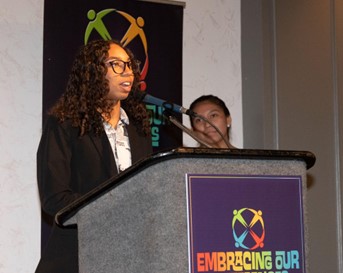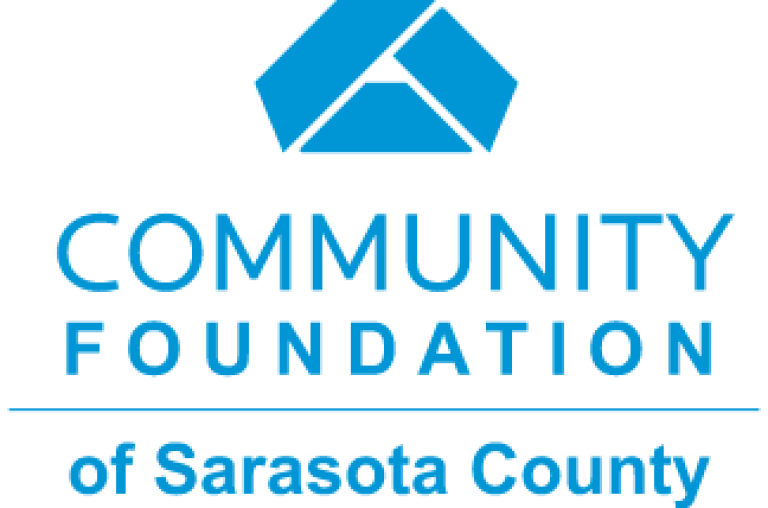April 18, 2023
Embracing Community
Categories: Nonprofits,
Editor’s note: This blogpost was written as a part of Ringling College of Art and Design’s Writing for Storytelling for Social Justice and Community Engagement course, fall semester 2022, led by instructor Sylvia Whitman. Students were paired with nonprofits to learn about their mission and impact, and the post that follows shares the story of Embracing Our Differences.
The project was completed as part of a collaboration with The Glasser/Schoenbaum Human Services Center. Many thanks to Charlene Altenhain and Sarah Glendening, especially, for their coordination of student writers to nonprofit organizations.
We all have those days where you wake up and it feels like nothing is going right. Those days where it feels like the world has it out for you and your only reprieve is to crawl back to bed and hide away. Sarasota high schooler Taiz Caminero had one of those days, but she wasn't able to retreat back to bed. Instead she had to pick herself up and go to school, upset that she had to be there instead of home—and upset that she was alone in her emotions.

Taiz Caminero speaking at the 2022 annual luncheon for Embracing Our Differences. Photo courtesy of Embracing Our Differences.
Unlike most school days, it was Unity Day, a program presented by the nonprofit Embracing Our Differences in partnership with all the Sarasota County public high schools. Taiz came into Unity Day with low expectations. In an interview, she described thinking “it was going to be lame.” With her negative expectations, she slunk into an experience full of positivity, so much positivity that her mood shifted from miserable to safe and happy.
Unity Day brought a positive outlook as everyone was welcomed, not pressured, to share stories and experiences without fear of judgment. Experiences like Taiz’s terrible morning were well received; she was able to properly vent and process along with her peers. Taiz was amazed by how welcoming it was and how even people who didn't feel particularly overloaded, like herself, could take time to share with no negative perceptions.
Taiz noted a game she played on Unity Day called Common Ground. In this game participants introduce themselves and then use the phrase “You have common ground with me if ___,” filling in the blank with an experience they have had. The game also has a musical chairs quality as people who share that trait get up and change seats to sit next to new people. The game's purpose is to create a fun and safe outlet for students to communicate and find common ground with their peers, with students sharing experiences that can range from bad mornings to bullying or abuse.
Taiz described an experience in the Common Ground game where a student in her Unity Day group stated, “You have common ground with me if you don’t feel safe in school.” Taiz had never considered whether she felt safe at school. She had never connected herself to that feeling until she was directly faced with it as she didn’t feel like she had any significant trauma that would lead to that feeling. But she realized she didn't feel safe in school.
Even though players all had different experiences and varying degrees of trauma, no one was judged. Everyone's feelings were valid, and no one dismissed anyone's feelings because of a perceived lack of trauma. Instead, everyone was accepted and was given a communal space to start feeling safe.
Having such a space is immensely important, especially with current world events making people question their safety. When I first met with Embracing Our Differences, I was introduced to their belief by staffer Ben Jewell-Plocher that “each school is its own community, and each school has its own things going on underneath.” It's a belief in empathy that everyone, despite how their life may appear on the outside, has their own hardships and struggles on the inside.
Empathetic beliefs led Taiz to return to Unity Day as a student volunteer. Taiz explained that her connection to the event comes from her family's high value on service. Taiz comes from a Hispanic family in which community is everything; her mother raised her to help the people around you. Not just your family but your neighbors, teachers, and people in need. Taiz explained that “it feels like I’m helping someone else find themself and their community.”
And she isn't alone. These feelings are echoed by the swarms of students and teachers positively affected by Unity Day, with common descriptions of “eye opening, beneficial, and necessary.”
Unity Day is just one of the many important education programs that Embracing Our Differences offers the community. While the nonprofit is more commonly known for its attention-grabbing art exhibits that raise awareness for diversity and inclusion, the organization actually devotes more time to year-round education programs offering direct support in teaching students character and life skills. Embracing Our Differences provides free field trips, workshops for educators, coexistence clubs, community collaborations, and more.
Since 2004 over 529,000 students have participated in Embracing Our Differences education events; 52,274 of these were students who participated in 2021 and 2022. If you have a drive to help the community, please consider supporting Embracing Our Differences and their education programs like Unity Day.
